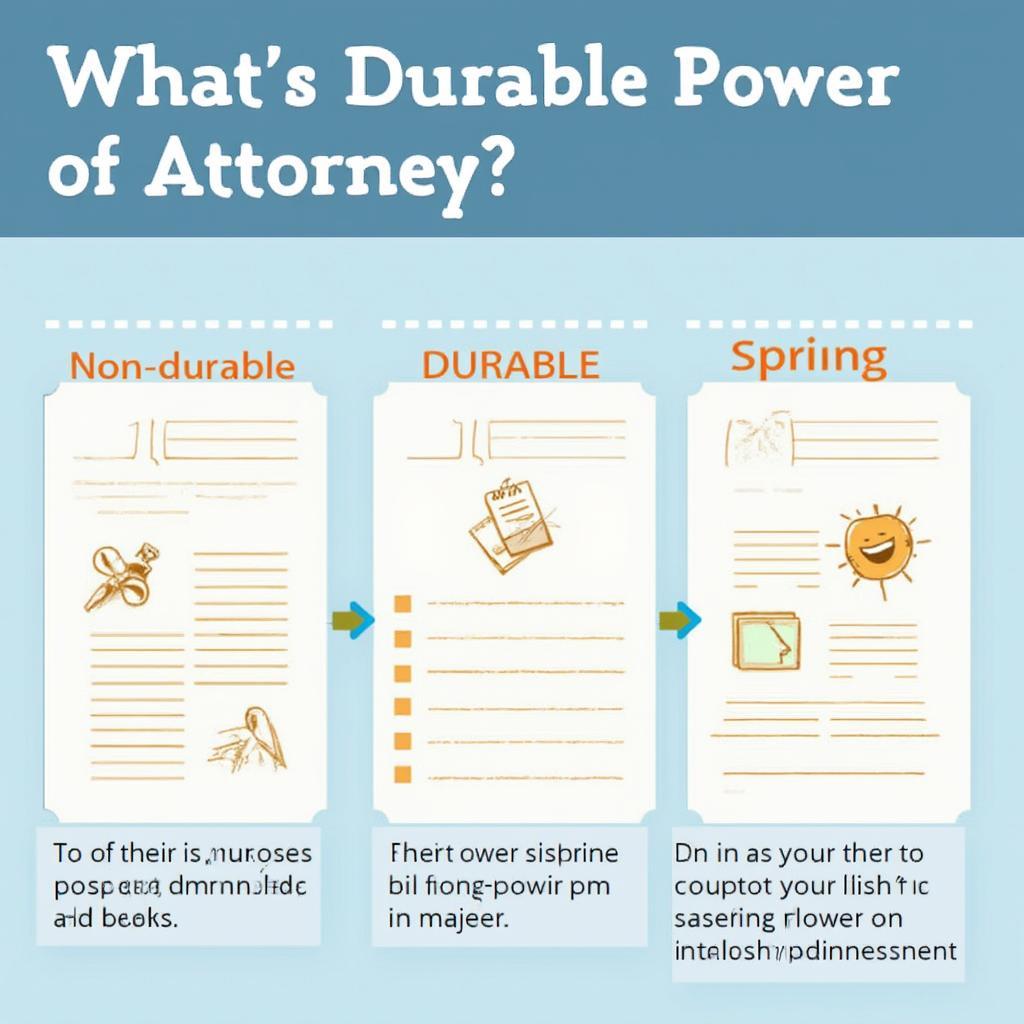
How Long Does Durable Power of Attorney Last?
A durable power of attorney (POA) grants someone the authority to act on your behalf in legal and financial matters. Understanding how long a durable power of attorney lasts is crucial for both the grantor (the person giving the power) and the agent (the person receiving the power). The duration of a POA depends on its specific terms and the laws of the state where it was created.
Different Types of Durable Power of Attorney and Their Duration
There are several types of durable POAs, each with its own duration characteristics. Understanding these nuances is critical for effective estate planning.
Non-Durable Power of Attorney
A non-durable POA terminates if the grantor becomes incapacitated or mentally incompetent. This type of POA is typically used for specific transactions and is not designed for long-term use.
Durable Power of Attorney
This is the most common type and remains effective even if the grantor becomes incapacitated. It lasts until the grantor revokes it, it expires according to its terms, or the grantor passes away.
Springing Durable Power of Attorney
This POA becomes effective only upon the occurrence of a specified event, typically the grantor’s incapacitation. This activation event must be clearly defined in the document. Once activated, it functions like a regular durable POA.
Terminating a Durable Power of Attorney
While designed for long-term use, a durable POA can be terminated under certain circumstances. These include revocation by the grantor (while still mentally competent), the death of the grantor, or the expiration of the POA as specified in the document.
 Types of Durable Power of Attorney
Types of Durable Power of Attorney
Understanding State Laws Regarding Durable Power of Attorney
State laws significantly influence the duration and validity of a durable POA. Variations exist regarding the required formalities for creating and revoking a POA, including specific wording, witnessing requirements, and notarization.
Varying State Requirements
Some states impose specific time limits on the effectiveness of a durable POA, requiring periodic renewal. Others may have specific regulations regarding the scope of powers granted to the agent. Consulting with an attorney in your jurisdiction is essential to ensure compliance with your state’s specific legal requirements.
Impact of Incapacity
The very purpose of a durable POA is to ensure continuity of management even if the grantor becomes incapacitated. However, state laws may dictate how incapacity is determined and documented, potentially impacting the activation of a springing durable POA.
Importance of Consulting with an Attorney
Navigating the complexities of durable POAs requires professional legal guidance. An attorney can tailor the document to your specific needs and ensure compliance with state laws.
Protecting Your Interests
A properly drafted POA safeguards your interests by clearly defining the agent’s authority and limiting the potential for misuse. It provides peace of mind knowing that your affairs will be handled according to your wishes.
Avoiding Potential Conflicts
An attorney can anticipate and address potential conflicts or ambiguities in the POA, minimizing the risk of future disputes among family members or other interested parties.
“A well-drafted durable power of attorney is a cornerstone of effective estate planning. It provides clarity and ensures your wishes are respected, even in unforeseen circumstances,” says Nguyen Thi Lan Anh, a seasoned estate planning attorney at Pham & Associates Law Firm in Hanoi.
Common Misconceptions about Durable Power of Attorney
Several misconceptions exist regarding durable POAs. Clarifying these misunderstandings is crucial for making informed decisions.
POA as a Replacement for a Will
A POA is not a substitute for a will. While a POA allows the agent to manage your affairs during your lifetime, a will dictates the distribution of your assets after your death. Both documents are essential components of a comprehensive estate plan.
Agent’s Unlimited Power
The agent’s authority is limited to the powers specifically granted in the POA document. They are legally obligated to act in the grantor’s best interest and cannot use the POA for personal gain.
“Clients often underestimate the importance of regularly reviewing and updating their estate planning documents, including their durable power of attorney. Life changes, such as marriage, divorce, or the birth of a child, can necessitate revisions to ensure your POA remains aligned with your current wishes,” advises Tran Van Minh, a senior partner at Le & Nguyen Law Firm in Ho Chi Minh City.
Conclusion
Understanding how long a durable power of attorney lasts is critical for effective estate planning. By working with a qualified attorney, you can create a POA that meets your specific needs and protects your interests. A durable power of attorney is not just a legal document; it’s a safeguard for your future.
FAQ
-
Can I revoke my durable power of attorney at any time?
Yes, as long as you are mentally competent. -
What happens to my durable POA if I move to another state?
The validity of your POA may be affected. Consult with an attorney in your new state. -
Can my agent make healthcare decisions for me with a durable POA?
Not unless the POA specifically grants healthcare powers. -
Who can I choose as my agent for a durable POA?
Any trusted individual, typically a family member, friend, or attorney. -
Do I need to register my durable power of attorney?
Requirements vary by state. Consult with an attorney. -
Can I have more than one agent under a durable POA?
Yes, you can appoint co-agents or successor agents. -
What if my agent refuses to act under the durable POA?
You can appoint a successor agent or revoke the existing POA and create a new one.




